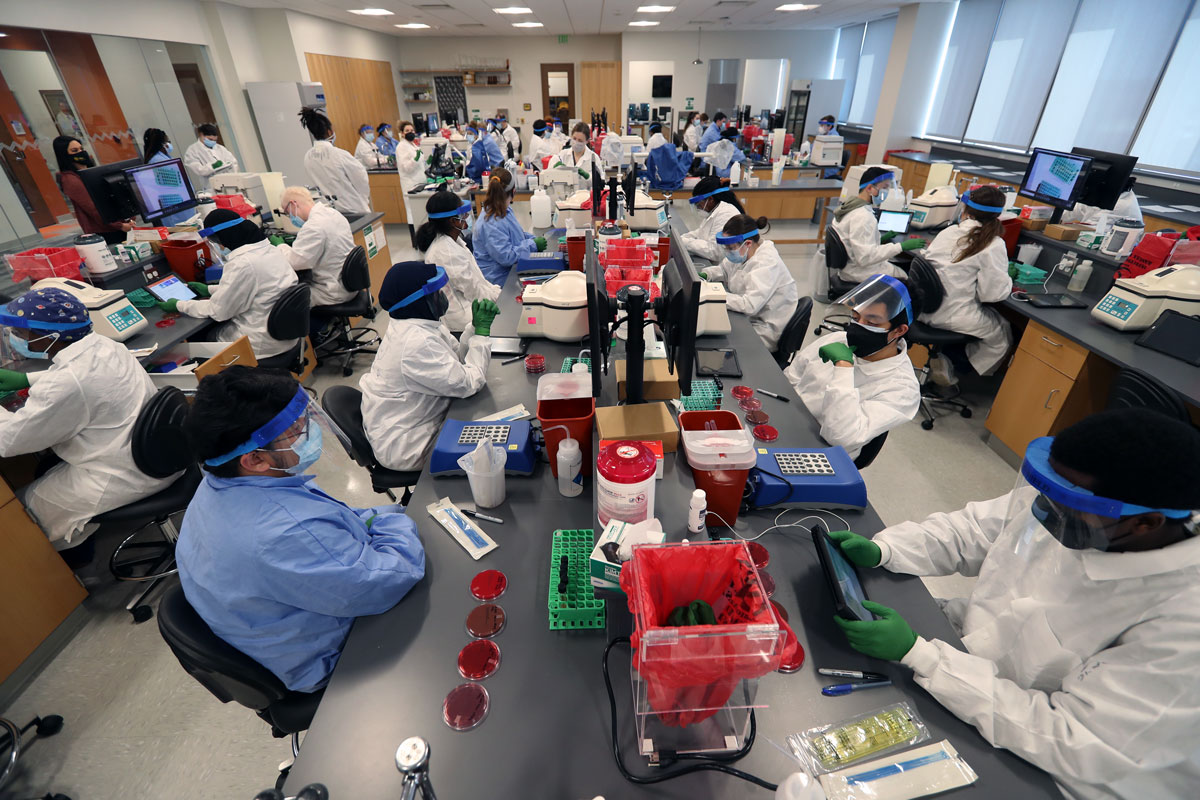Unique collaboration between VCU, Virginia’s public health and environmental laboratory aims to train future scientists
RICHMOND, VA - Virginia Commonwealth University (VCU) and the Department of General Services (DGS) today announced a unique partnership between the university and DGS’ Division of Consolidated Laboratory Services (DCLS), Virginia’s public health and environmental laboratory, to offer concentrated studies intended to prepare the next generation of scientists to work in public health laboratories. The two organizations will collaborate to offer a Medical Laboratory Sciences Master of Science with a concentration in public health laboratory sciences beginning in the Fall 2023 semester.
 The new concentration, housed in VCU’s College of Health Professions, is one of only a few in the nation to offer specialized classes taught by public health laboratory professionals, as well as hands-on experience in a public health laboratory. Concentrated classes focus on fundamentals in public health; epidemiology and laboratory surveillance; laboratory techniques and emergency preparedness and response; quality and ethics; as well as a clinical practicum that would allow students to rotate through different DCLS labs.
The new concentration, housed in VCU’s College of Health Professions, is one of only a few in the nation to offer specialized classes taught by public health laboratory professionals, as well as hands-on experience in a public health laboratory. Concentrated classes focus on fundamentals in public health; epidemiology and laboratory surveillance; laboratory techniques and emergency preparedness and response; quality and ethics; as well as a clinical practicum that would allow students to rotate through different DCLS labs.
The deadline for students to apply for this two-year program is June 1, 2023. To learn more or to apply, visit the VCU Medical Laboratory Sciences website.
“Medical laboratory professionals are the unsung heroes whose work behind the scenes provides the valuable information physicians need in order to determine an accurate diagnosis and appropriate treatment,” said Teresa Nadder, Ph.D., chair of the Department of Medical Laboratory Sciences at the VCU College of Health Professions. “We are excited to partner with the Department of General Services, and we hope this new program brings greater opportunities to advance the medical laboratory profession.”
“Over the past few years, the world has realized just how important it is to have a robust public health network,” said Joe Damico, DGS Director. “This collaboration is intended to address an urgent need for public health laboratory expertise not only in Virginia, but across the nation. These students will not only receive lectures from public health scientists, they’ll get hands-on experience in one of the largest and most diverse public health laboratories in the nation.”
Dr. Denise Toney, Director of DCLS, added: “We are thrilled to be able to provide this unique opportunity to not only educate the next generation of public health laboratory professionals, but more importantly to create a public health career pipeline.”
Students must have a baccalaureate degree from an accredited college or university with a major in clinical laboratory sciences (medical technology); national certification as a medical laboratory scientist or equivalent level; minimum undergraduate GPA of 3.0; three letters of recommendation; and a satisfactory interview.
Students must complete 11 credit hours in the public health concentration, in addition to the 23 core graduate credit hours required in the program. The new public health concentration is one of four available for students seeking a Master of Science in Medical Laboratory Sciences. The other MLS MS program concentrations are the Advanced, Categorial and Accelerated.
The Department of Medical Laboratory Sciences provides students with advanced theoretical and technical education and prepares them to assume roles as laboratory supervisors, educators and researchers.
The Division of Consolidated Laboratory Services, which celebrated its 50th anniversary in 2022, was the nation’s first consolidated laboratory. As such, it offers a wide variety of unique laboratory testing services in support of public health, environmental protection, and emergency response. Each year, DCLS performs over 9 million tests ranging from bacterial, viral and other disease agents such as COVID-19, Ebola and monkeypox; screening all newborns for potentially deadly genetic and metabolic disorders; air, drinking water and recreational water testing; food safety testing; and emergency testing for biological, chemical and radiological agents.
